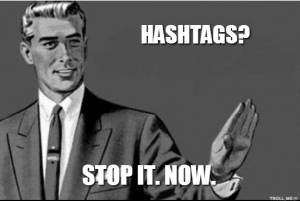Hashtagging has been an integral component in social media communication and brand engagement over the years. They are used to convert a keyword or phrase into a link that readers click on to participate in a conversation. It’s a way to stay up to date on a trending topic and join a network of conversationalists that boast, banter, or debate about a topic of interest.
I used to enjoy hashtagging, a lot. It was my way of waving my virtual hands across hundreds of newsfeeds on Facebook and shouting “Hey, look over here!” My personal favorites were #YOLO, #Selfie, or any impromptu phrase I came up with–but those were always rendered useless. Hashtags made my posts more interactive and were occasionally used to flex my comedic muscles.
But there are some who are ditching the #hashtag.
According to Coffee (2015), Shadi Rahimi, a deputy producer of Al Jazeera’s AJ+, argued that hashtagging is an unoriginal and ineffective way to gain readership. Journalists, Rami claimed, are now parting ways with hashtags on social media because they’re supposed to be perceived as objective writers, and hashtagging instantaneously stamps their digital content as editorial-based instead of hard news coverage that should be taken seriously (Coffee, 2015). At one point Twitter had considered modifying their site to minimize the view of hashtags for a cleaner appearance (Gibbs, 2014).
As unattractive as they look, it’s proven that this method of marketing has been successful in promoting a product or service. Writer Tom Spencer (2015) from PRDaily.com suggests “…83 percent of all social campaigns in the past year featured nothing more than a prominent hashtag” (para. 2). Spencer (2015) argued that hashtags could stay alive so long as the PR agency or person knows how to get creative and experiment with different keywords and placement.
I find that I limit the amount of hashtags I include on my posts now, because there’s an unspoken etiquette about using them. Too many hashtags may steer readers away from my posts and I could be perceived as someone who is crying for attention. As people become more familiar with them, Coffee (2015) concludes, “…They’re just less relevant to brand strategy as their value becomes clearer” (para. 8).
References
Coffee, P. (2015, June 10). No One Uses #Hashtags Anymore. Retrieved on June 11, 2015 from http://www.adweek.com/prnewser/no-one-uses-hashtags-anymore/115101
Gibbs, S. (2014, March 21). Twitter Could Ditch @Replies and Hashtags. Retrieved on June 13, 2015 from http://www.theguardian.com
Spencer, T. (2015, February 12). 4 ways PR and marketing pros can use hashtags. Retrieved on June 12, 2015 on http://www.prdaily.com


3 Responses to An Uncertain Future For The #Hashtag